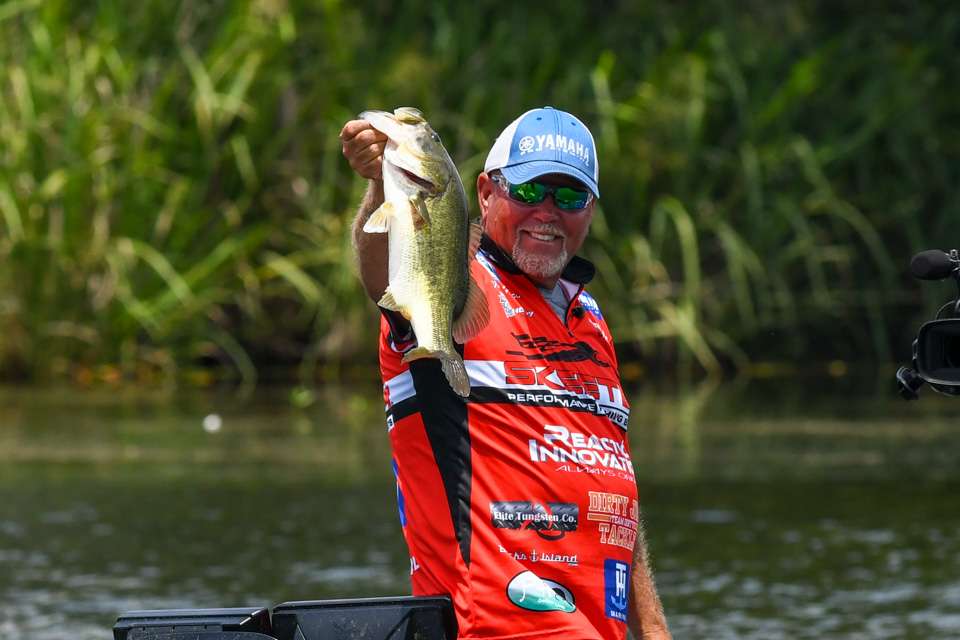
In purely mathematical terms, there’s just as much chance the winner of the 2020 Academy Sports and Outdoors Bassmaster Classic presented by Huk will take his victory lap to the sounds of “O Canada” as to “Sweet Home, Alabama.”
For the first time in the 50-year history of the Classic, there are three Canadians in the field, and their numbers will be matched by an unusually low number of Alabama residents. For purposes of comparison, there were nine Alabamians in the 2019 field of 52, 11 in the 2018 field of 52 and 10 in the 2017 field of 51.
Those latter two tournaments were won by Auburn grad Jordan Lee. His brother Matt came in fourth in 2018, and fellow Tiger Steve Kennedy was the runner-up in 2017, so perhaps a cry of “War Eagle!” would have been more appropriate than “Roll Tide!” but the trophies remained in the vicinity of the birthplace of B.A.S.S. This year, it may very well do the same, but the Lees are gone, and for the first time in many years Alabama will be comparatively underrepresented.
Of course, the three Alabama residents who will compete are no slouches. None of them have won a Classic yet, but Scott Canterbury of Odenville is the reigning Bassmaster Angler of the Year, Clent Davis of Montevallo won the 2018 Forrest Wood Cup and Matt Herren of Ashville won the 2016 Toyota Texas Bass Classic. All of them have substantial experience on the Big G, but that’s no guarantee of a win. All three finished behind Jamie Hartman, who moved from New York to Arkansas, and Chris Zaldain, who moved from California to Texas, at the 2019 Elite Series tournament on Guntersville in June. Nevertheless, their track records might give them a leg up on the portion of the competition not so attuned to Alabama bass or the sport’s biggest stage.
For years it was presumed that a local could not win the big dance. The hometown pressures and spectator traffic consistently derailed chances. For example, prohibitive favorite Woo Daves came in second, fourth and fifth at three consecutive Classics on Virginia’s James River, failing to capture the top prize in an event where most competitors think that only first place matters. A decade later he finally claimed the title on Lake Michigan out of Chicago, more than 800 miles away from home. The paradigm changed in 2007 at Alabama’s Lay Lake, when a relative unknown named Boyd Duckett of Demopolis beat 49 other anglers, including eight others who’d either been raised in Alabama or moved there previously, to break the hometown jinx.
Seven years later, Alabama transplant Randy Howell, who’d moved to Alabama from North Carolina in 1998, came from behind to win at Guntersville, outlasting upstart Paul Mueller of Connecticut and nine Alabama qualifiers to take the trophy for a short drive home. In between those two Alabama victories, a Michigander named Kevin VanDam came to Lay Lake in 2010 and earned the third of his four Classic trophies – all out of state. In Chicago, the closest the tournament has ever been held to his Kalamazoo home, he came in 29th.
Subsequently, Casey Ashley won at Lake Hartwell in his home state of South Carolina in 2015. The following year Edwin Evers made a mad dash on Day 3 to win at Grand Lake in his home state of Oklahoma.

This will be Herren’s eighth Classic, and second in Alabama. The only time he’s finished in the top 20 was when he came in seventh at Lay Lake in 2010. Likewise, in six Forrest Wood Cup entries, he finished in the top 20 only once, when he came in sixth on South Carolina’s Lake Murray in 2014. In two Alabama Cups, both on Logan Martin, he finished 24th and 43rd.
This will be the first Classic for Canterbury and Davis.
Davis made the Forrest Wood Cup three times, never qualifying for one in Alabama, eventually winning in Arkansas.
Canterbury qualified for 10 Cups in 11 years, finishing second at Lake Lanier and Lake Murray in 2012 and 2014, respectively, but 21st in his one crack at an Alabama Cup, in 2016 at Lake Wheeler, just downstream from Guntersville.
All of that championship history, though, will be erased when the tournament starts. Each competitor will be equal, and they’ll be competing on one of the healthiest bass fisheries in the world. Nevertheless, conventional wisdom says that a prolific fishery with abundant grass, particularly one with a substantial tournament history like Guntersville, may provide less of a home-field advantage than any other Classic venue. That didn’t stop Howell, but it’s not clear that the location gave him any advantage beyond natural fishing ability and acumen.
Indeed, notwithstanding the 2014 Classic, the five of the last six Elite events held on Guntersville have been won by out-of-staters: Hartman (New York/Arkansas) in 2019; Skeet Reese (California) in 2015; and Reese again in 2010. Alabama resident Aaron Martens won there in 2009, but he’d just moved there a few years earlier, and at least at the time was more closely associated with his home state of California. Reese came in second that year, so perhaps the field should be glad that he won’t be competing this time around. In 2007, Michigan’s VanDam won by more than 7 pounds, and the year before New Jersey’s Mike Iaconelli outlasted Texan Alton Jones by 2 ounces to take home the trophy.
While the Tennessee River impoundments have a reputation for attracting large galleries of spectator traffic, it’s not clear that Canterbury, Davis or Herren will attract a monumental following from the start. Rather than seeing that as a sign of disrespect, they should relish the opportunity to fly a bit below the radar, staying close and then making a last day charge in the style of previous champions.
It can be done, regardless of what the math says, but it’s far from easy.

